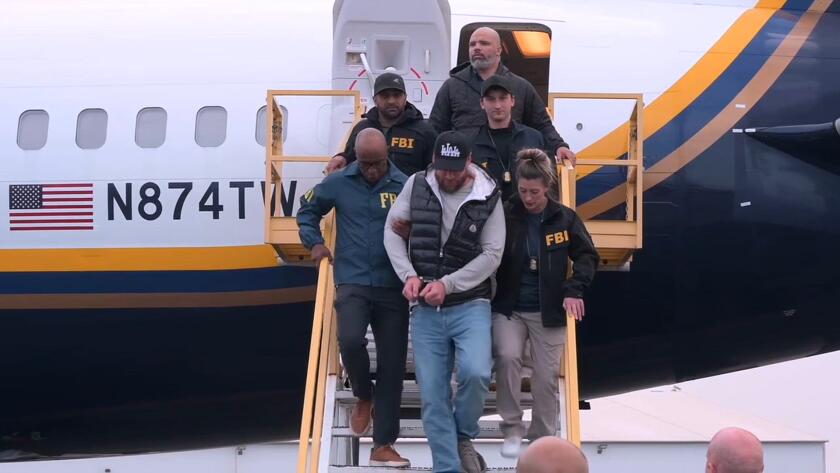Feds arrest fugitive Olympic snowboarder accused of becoming drug lord
Ryan Wedding, a former Canadian Olympic snowboarder who allegedly became the head of an organization that trafficked large quantities of drugs through L.A., was apprehended recently in Mexico, U.S. officials announced Friday.
Authorities said Wedding, who was in hiding for more than a decade and on the FBI’s “Ten Most Wanted Fugitives” list, was taken into custody in Mexico City Thursday night and has been returned to the United States. Two sources, who requested anonymity to discuss the pending case publicly, told The Times that Wedding negotiated his surrender.
FBI Director Kash Patel and other officials announced Wedding’s arrest at a news conference at Ontario International Airport on Friday morning.
“Just to tell you how bad of a guy Ryan Wedding is, he went from an Olympic snowboarder to the largest narco trafficker in modern times,” Patel said. “He is a modern-day El Chapo, he is a modern-day Pablo Escobar. And he thought he could evade justice.”
Los Angeles Police Chief Jim McDonnell said Wedding’s alleged global drug trafficking organization “used Los Angeles as its primary point of distribution.”
McDonnell said the efforts of authorities resulted in the seizure of more than 2,300 kilograms of cocaine, 44 kilograms of methamphetamine, 44 kilograms of fentanyl, eight firearms and more than $55 million in illicit assets.
“Together, we have disrupted a major narcotics pipeline impacting Los Angeles, the United States and Canada,” McDonnell said. “This is a significant blow to a criminal network that has endangered communities across borders.”
Former Canadian Olympic snowboarder Ryan Wedding faces federal charges that accuse him of running a drug trafficking organization and ordering the killing of a witness against him. (FBI)
Akil Davis, assistant director in charge of the Los Angeles FBI field office, said Wedding’s alleged organization shipped approximately 60 metric tons of cocaine through Southern California on its way to Canada.
Authorities have arrested 36 people for their role in the transnational organization and the treasury department has sanctioned 19 people, including Wedding, according to Davis.
Wedding allegedly became a major trafficker of cocaine into Canada and the United States and a ruthless leader who ordered killings, including one of a witness in a 2024 federal narcotics case against him. The order resulted in the victim being shot to death in a restaurant in Medellín, Colombia, in January 2025, prosecutors said.
“Ryan Wedding tormented several people and several families that will never be the same,” Davis said. “But today they get the justice that they sought.”
Atty. Gen. Pam Bondi previously said Wedding’s operation was responsible for generating more than $1 billion a year in illegal drug proceeds.
A federal indictment against Wedding alleges his organization sourced its cocaine from Colombia, cooking and testing it in “cocaine kitchens” run collaboratively with a Colombian paramilitary group and drug cartel.
The so-called Wedding Criminal Enterprise worked with Mexican cartels, utilizing boats and planes to move drug shipments from Colombia, then using semitrucks to get the loads into the United States, U.S. authorities charged. Los Angeles, San Bernardino and Riverside counties generally served as the “hub” where the organization’s cocaine was stored before being conveyed to final destinations in other parts of the U.S. and in Canada, according to the indictment.
On Friday, Mexican Security Minister Omar García Harfuch posted on X that Patel was returning to the U.S. with two priority targets: “a non-U.S. person who was detained by Mexican authorities among the FBI’s 10 most wanted and a Canadian citizen who voluntarily surrendered” at the U.S. Embassy.
Wedding’s capture follows a mass transfer of cartel suspects from Mexico to U.S. custody, with authorities south of the border handing over 37 inmates for prosecution. The Department of Justice said the defendants include high-ranking members of the Jalisco New Generation, Sinaloa and Gulf cartels.
Extraditions of high-level cartel suspects from Mexico have in past eras taken years to accomplish. Now, as it faces pressure from the Trump administration, the Mexican government has began moving quickly to expel some key figures outside of the standard process.
Wedding was previously charged in a 2024 indictment with running a continuing criminal enterprise, assorted drug trafficking charges and directing the murders of two members of a family in Canada in retaliation for a stolen drug shipment.
Authorities said Wedding’s aliases included “El Jefe,” “Public Enemy” and “James Conrad Kin.”
Wedding competed for his home country, Canada, in the 2002 Winter Olympics in Salt Lake City.
Mexican officials last year began handing over dozens of alleged cartel leaders facing charges in U.S. federal courts, including Andrew Clark, Wedding’s alleged lieutenant, who is facing prosecution in Los Angeles.
In December, the New York Times cited U.S. and Canadian court documents that indicated Clark had started cooperating with authorities against his former boss. The records reportedly showed a witness believed to be Clark had “agreed to assist U.S. authorities in the investigation of Wedding’s organization.”
An attorney for Clark did not respond to a request for comment Friday.

